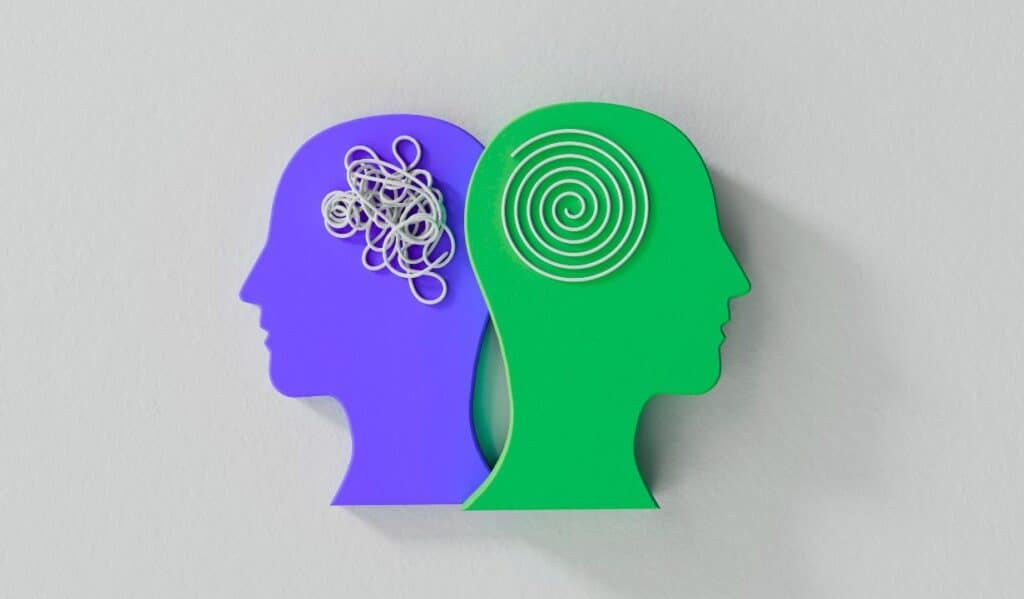🔥 When Anxiety Fuels the Flames: A Story We All Know
Have you ever felt that burning sensation rising within you? That moment when your heart races, your face flushes, and words escape your mouth before you can catch them? You’re not alone in this battle. 👊
Like Paula, who came to InnerOptimal feeling trapped in a cycle of guilt and anxiety, many of us struggle with expressing our true feelings. Instead, we default to anger—our brain’s primitive response to emotional distress.
 Paula often found herself angry with her husband because she felt guilty about expressing her true feelings on various topics. Trapped in a loop of guilt and anxiety, she spoke in an angry manner that damaged their relationship.
Paula often found herself angry with her husband because she felt guilty about expressing her true feelings on various topics. Trapped in a loop of guilt and anxiety, she spoke in an angry manner that damaged their relationship.
🧠 Understanding Your Brain’s Role in Anxiety and Anger
Your brain isn’t working against you—it’s trying to protect you! But sometimes, its ancient programming needs an update:
- Reptilian Brain: Your survival center, ready to fight! 🐉
- Limbic System: Your emotional processing hub 💓
- Neocortex: Your rational thinking powerhouse 🧩
When someone like Paula experiences trauma causing stress, anxiety, or anger, the reptilian brain becomes predominant. Meanwhile, the neocortical brain—which has a much better ability to handle stressful events and maintain calm—takes a backseat.
😨 The Anxiety-Anger Cycle: Breaking Free 
Did you know anxiety often masquerades as anger? Here’s what happens:
- You feel anxious about expressing yourself
- This anxiety creates tension and discomfort
- Your brain perceives this as a threat 🚨
- Your reptilian brain activates, triggering anger as a defense
As Paula’s brain training progressed, her brain restored a healthier balance between the reptilian, limbic, and neocortical parts. Eventually, she was able to manage her conflict and anger issues, leading to better relationships and peaceful discussions.
🌟 From Anxiety to Emotional Freedom
The Anxiety Challenges You Face Daily
Every day, you navigate a world full of triggers—criticism from colleagues, family disagreements, or unexpected obstacles. These challenges activate your reptilian brain, leaving you feeling trapped in reactions you later regret.
People showing characteristics of hypersensitivity to social criticism due to traumatic events view nearly every situation negatively. They react poorly to criticism or suggestions and tend to imagine negative judgment from others even when it’s not there.
The Guide You Need for Anxiety Management
Understanding how your brain works is the first step toward transformation. With the right techniques, you can redirect your brain’s energy from anxiety-driven anger to responsive calm.
Your Path Forward Through Anxiety
Try this simple but powerful exercise tonight:
🌙 The Five Positives Technique for Anxiety Relief 🌙
Just before bedtime, think about five positive things that happened during the day. Remembering positive events every day helps install positive thinking. This is a very powerful way to bring peace and calm. It also helps you get a good night’s sleep.
- Find a quiet moment before sleep
- Reflect on your day with intention
- Identify five positive moments (no matter how small)
- Savor each memory for a few seconds
- Notice how your body relaxes as anxiety melts away
⚠️ What’s at Stake? The Cost of Unmanaged Anxiety and Anger
Unmanaged anxiety and anger don’t just ruin your day—they can damage:
- Your physical health (hello, stress hormones!) ❤️🩹
- Your most treasured relationships 👨👩👧👦
- Your professional reputation 💼
- Your self-image and confidence 🪞
🏆 The Victory That Awaits: Life Beyond Anxiety
Imagine waking up each day feeling in control of your emotions rather than controlled by them. Picture having conversations where you express your true feelings without the anxiety-fueled aftermath of anger. 
With proper training, clients are able to restore positive and objective thinking that is considered difficult, if not impossible to establish, when the problem is not efficiently addressed.
🚀 Overcoming Anxiety Today
- Start Tonight: Try the Five Positives exercise before bed
- Track Your Anxiety Triggers: Identify what situations spark your anxiety and anger most often
- Practice the Anxiety Pause: When anxiety rises, count to 10 before responding
- Seek Support: Consider professional guidance for lasting transformation of anxiety patterns
Remember: Anxiety isn’t your enemy—it’s a messenger. Learning to listen to this messenger without being consumed by its delivery is the art of emotional intelligence.
Are you ready to begin your journey from anxiety to calm? Your more balanced, connected life is waiting just on the other side of understanding. 💪💖
The InnerOptimal team wishes you a happy summer.
What anxiety triggers have you noticed in your own life? Share in the comments below, and let’s learn from each other’s journeys!





